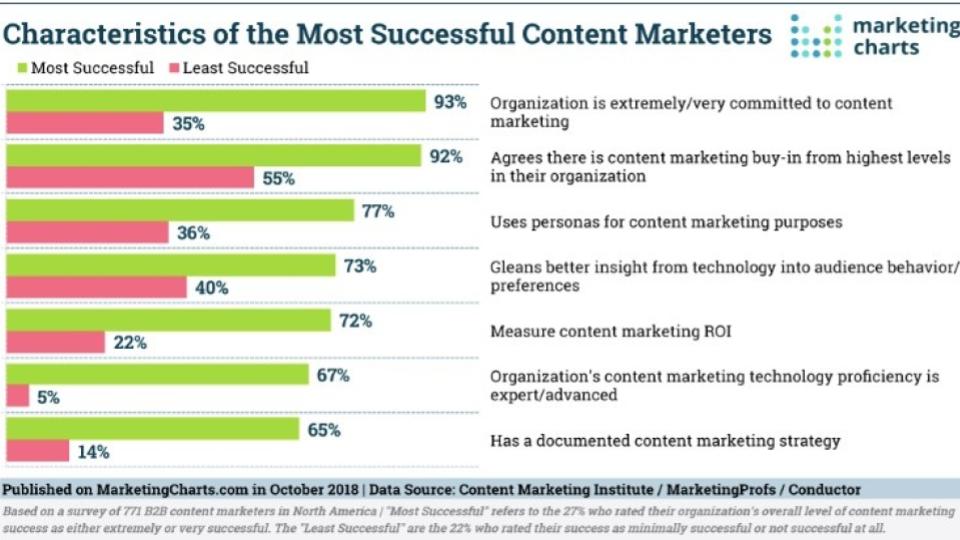
Written by Michael Phelan – Principal and Founder of Go-to-Market Pros
Some 27% of B2B content marketers in North America rate their organization’s overall level of content marketing success as “extremely” (4%) or “very” (23%) successful, while 22% rate it as “minimally” (20%) or “not at all” successful (2%), per research from the Content Marketing Institute. So what are the former doing that the latter aren’t?Beyond being more likely to put their audience’s needs first, the research turns up a host of behaviors that successful B2B content marketers are engaging in that their less-successful peers are lacking.
Here’s a look at some of the areas with the biggest discrepancy between the most and least successful respondents.
Least Successful Marketers’ Tech Proficiency Lags
B2B content marketers are using a range of technologies to assist with the management of their content efforts, ranging from social media publishing and analytics to email marketing software, analytics tools, and marketing automation systems.
Clearly, though, some are more proficient in the use of these technologies than others. In fact, this may be the area in which responses from the most- and least-successful marketers differed the most.
Fully two-thirds (67%) of the most successful respondents described their organization’s proficiency with the use of content marketing technology as being either expert (19%) or advanced (48%). The percentage of the least successful respondents who could say the same? Only a paltry 5%.
B2B marketers report a range of benefits from the use of content marketing technologies, including better insight into how content is performing and better insight into audience behaviors and preferences. Perhaps as a result of their lesser proficiency with content marketing technology, the least successful marketers are having trouble deriving those insights. For example, only 22% measure content marketing ROI, versus 72% of the most successful respondents. Moreover, only about half as many (40% vs. 73%) say they’re able to glean better insight from technology into audience behavior and preferences.
Organizational Buy-In… Helps
Another large disparity between successful and non-successful content marketers? The former enjoy buy-in at the highest levels of organization, something that presumably allows them the resources and leeway to pursue greater degrees of success.
Virtually all (93% of) top content marketers report that their organization is extremely or very committed to content marketing, versus just one-third (35%) of the least successful marketers. It’s not necessarily a causal relationship, though: it may be that the most successful marketers have buy-in because they’ve proven success with content, rather than their being successful due to buy-in…
Nonetheless, 92% of the most successful marketers agree that there is content marketing buy-in from the highest levels in their organization, against about half (55%) of the least successful marketers.
One of the potential trickle-down effects of buy-in is an organizational strategy surrounding content marketing. And here again there’s a large divide between marketers. Consider that almost two-thirds (65%) of the most successful marketers have a documented content marketing strategy, versus just 14% of the least successful marketers.
The Most Successful Marketers Personalize Their Content
Personalization of digital content is not easy to achieve. But the most successful appear to be doing a much better job of it than their less-successful peers.
Some 81% of the most successful marketers prioritize delivering the right content to the right audience(s) at the optimal times, versus one-third (32%) of the least successful marketers. Moreover, the most successful are almost three times more likely than the least successful to craft content based on specific points/stages of the buyer’s journey (77% and 28%, respectively).
It seems that between having a clear strategy, putting their audience’s needs first, and understanding the use of technology, the most successful marketers have figured things out to a greater extent than their peers. No wonder they consider themselves ahead of the pack…
The full study is available to view here.
About the Data: The report describes its methodology in part as follows:
“B2B Content Marketing 2019: Benchmarks, Budgets, and Trends—North America was produced by Content Marketing Institute and MarketingProfs and sponsored by Conductor.
The 9th Annual Content Marketing Survey, from which the results of this report were generated, was mailed electronically to a sample of marketers using lists from Content Marketing Institute, MarketingProfs, The Association for Data-driven Marketing & Advertising (ADMA), and WTWH Media, and UBM Technology Group.
A total of 1,947 recipients from around the globe—representing a full range of industries, functional areas, and company sizes—replied to the survey during June and July 2018. This report presents the findings from the 771 North America respondents who indicated their organization is for-profit, primarily selling products/services to businesses (B2B), and has been using content marketing for at least one year.”




